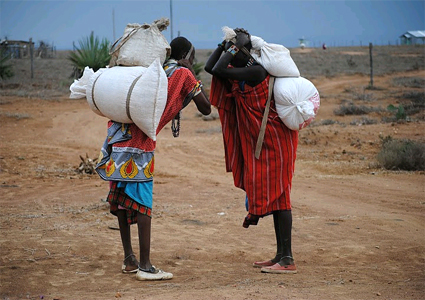With plans continuing to gel over the last week, the Christian Reformed World Relief Committee (CRWRC) announced today that it is drastically increasing its response to severe drought in East Africa. Previously planning a $4 million response, the agency now has a goal of distributing $7 million in emergency aid between August and December 2011. The response will include food supplies and drinking water, as well as fodder for livestock. This essential aid will help more than 100,000 Kenyans survive until the next harvest in January, 2012.
photo by Jacqueline Koster, CRWRC East Africa
For more photos and to follow CRWRC's
response in East Africa, click here.
With plans continuing to gel over the last week, the Christian Reformed World Relief Committee (CRWRC) announced today that it is drastically increasing its response to severe drought in East Africa. Previously planning a $4 million response, the agency now has a goal of distributing $7 million in emergency aid between August and December 2011. The response will include food supplies and drinking water, as well as fodder for livestock. This essential aid will help more than 100,000 Kenyans survive until the next harvest in January, 2012.
“The situation in Somalia is dire. However, CRWRC is in an excellent position to avert a similar crisis occurring in Kenya,” says Wayne de Jong, CRWRC director for disaster response and rehabilitation. “We have already been delivering food aid to 3,500 vulnerable Kenyan families since April, and now that the need has expanded significantly we thank God that we are able to respond with and through our capable Kenyan Christian partner organizations to reach an additional 10,500 families (nearly 75,000 people) and help them and their livestock survive until the next harvest.”
According to a U.N. snapshot issued at the end of June, drought and famine relief needs in Kenya have now surpassed those in Somalia, with 3.5 million Kenyans requiring humanitarian assistance. CRWRC has been active in drought response in east-central and coastal Kenya regularly over the last decade, working through local church and community partners to assist farmer-herders, and semi-nomadic herders and their families. From 2006 to 2010 CRWRC has engaged in four emergency food programs in Kenya that total nearly $7 million.
“So far,” de Jong says, “there has been a fairly limited global humanitarian response to the current situation in Kenya. But a major crisis, as is already the case in Somalia, can still be averted in most areas if we respond quickly with aid. We are also planning to respond in southern Ethiopia.”
De Jong says that the next rainy season is a short, unpredictable one that starts in October, 2011, and will hopefully result in a January, 2012, harvest—if the rains are good. “However, there is no likelihood of improvement before then, and if these short rains fail, the need in Kenya will become even more serious.”
Sufficient rain this fall would reduce and stabilize food prices, increase food availability, and restore the grazing land of herding communities across East Africa, de Jong says. However, the area’s vulnerable poor have suffered most from chronic hunger and deprivation, and their ability to cope has degraded over time. “This year may be the worst yet,” he says, “with some areas of Kenya receiving only ten percent of the rainfall expected after a year—or several—of failed harvests.”
In addition to food aid and food-for-work projects such as water catchments, tree planting, and growing grass to feed livestock, a CRWRC disaster risk reduction specialist is working within drought-affected communities to improve the likelihood of survival long-term. Risk reduction projects will help communities assess their resources and develop preparedness strategies that will reduce the impact of environmental conditions.
CRWRC director Andrew Ryskamp says that the organization is “responding to the urgent needs of people in Kenya with food, while also helping them recognize their own potential for successfully combating chronic drought conditions in the future. As we move into this new level of drought response in Kenya, we ask for your financial support and prayers for those who are suffering.”




